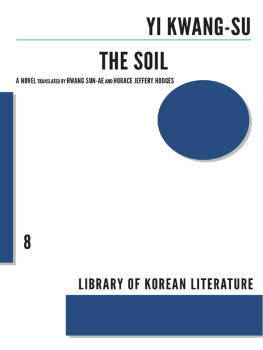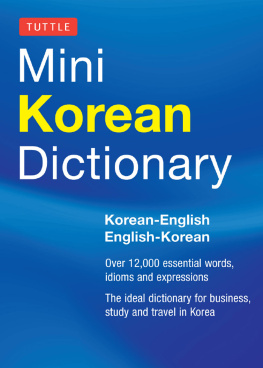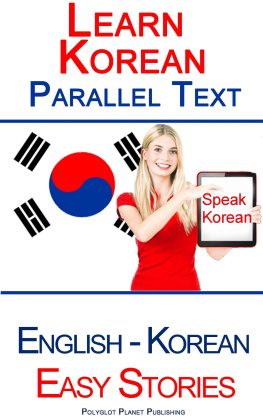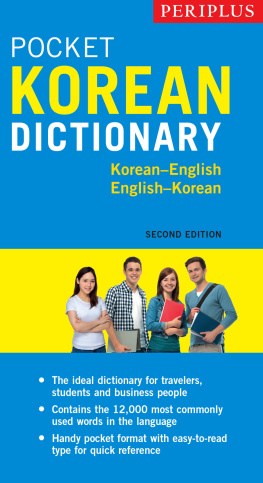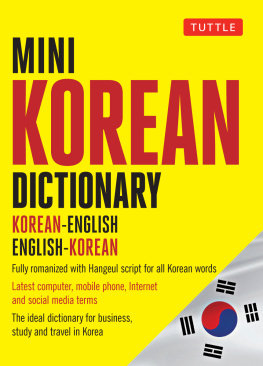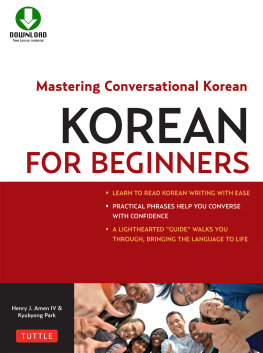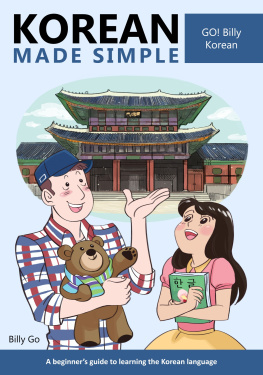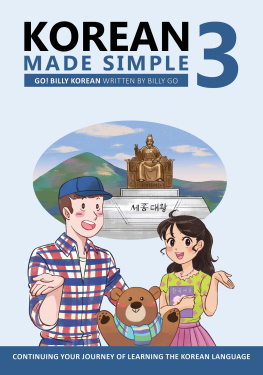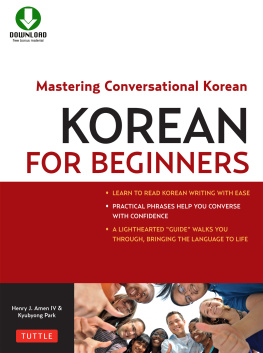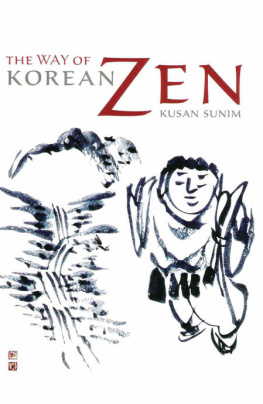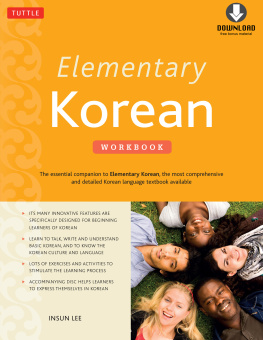
TITLES IN THE LIBRARY OF KOREAN LITERATURE
AVAILABLE FROM DALKEY ARCHIVE PRESS
1. Stingray
Kim Joo-young
2. One Spoon on This Earth
Hyun Ki Young
3. When Adam Opens His Eyes
Jang Jung-il
4. My Sons Girlfriend
Jung Mi-kyung
5. A Most Ambiguous Sunday, and OtherStories
Jung Young Moon
6. The House with a Sunken Courtyard
Kim Won-il
7. At Least We Can Apologize
Lee Ki-ho
8. The Soil
Yi Kwang-su
9. Lonesome You
Park Wan-suh
10. No One Writes Back
Jang Eun-jin
LIBRARY OF KOREAN LITERATURE
The Soil
Yi Kwang-su
Translated by
Hwang Sun-Ae and
Horace Jeffery Hodges

Originally serialized in Korean as Hk in the Dong-A Ilbo (East Asia Times), Seoul, April 1932July 1933
Translation 2013 by Hwang Sun-Ae and Horace Jeffery Hodges
First edition, 2013
All rights reserved
Library of Congress Cataloging-in-Publication Data
Yi, Kwang-su, 1892-1950
[Huk. English]
The soil / Kwang-su Yi ; translated by Hwang Sun-ae and Horace Jeffery Hodges. -- First edition.
pages cm
Originally serialized in Korean as Hk in the Dong-A Ilbo (East Asia Times),
Seoul, April 1932July 1933.
ISBN 978-1-56478-911-2 (print)
ISBN 978-1-56478-946-4 (e-book)
1. Community activists--Fiction. 2. Farmers--Fiction. 3. Korea--Rural conditions--Fiction. I. Hwang, Son-ae, translator. II. Hodges, Horace Jeffery, translator. III. Title.
PL990.9.K9H813 2013
895.733--dc23
2013027138
Partially funded by a grant from the Illinois Arts Council, a state agency

Library of Korean Literature
Published in collaboration with the Literature Translation Institute of Korea

www.dalkeyarchive.com
Cover: design and composition by Mikhail Iliatov
1-1
After returning from the night school where he taught, Heo Sung lay down, resting his neck upon his schoolbag and lacing his fingers behind his head to form a pillow. Lying still, he could hear mosquitoes buzzing to and fro as they tried to get around the mosquito-repellent smoke. Now that the seventh month of the lunar calendar was half past, the wind felt a bit cool after nightfall.
For a couple of years, Heo Sung had lived in Seoul with little possibility of hearing the mosquitoes buzz. In his hometown, even listening to them again pleased him.
How tall and beautiful Yu Sun has become, Heo Sung murmured to himself. Her image appeared before him, healthy and strong with gently rounded features. Though her face was tanned dark from the mountain regions strong sunlight, her eyes, nose, and mouth stood out sharply without losing the softness of a young womans features. Reflecting moonlight, her face had been beautiful, almost like moonlight itself. Only her roughened hands did not fit. Used for weeding fields and working in water, they were not the porcelain hands of a city woman. She wore a stiff skirt and a traditional summer jacket of hemp cloth, along with black rubber shoes. She went without socks, which left the tops of her feet darkly tanned. Equally dark were her hands, wrists, and neck, as well as her calves below the short bloomers and shorter skirt, as if the summer sunlight had wished to kiss her body whenever offered a chance, desiring her beautiful and healthy skin.
Heo Sung tried to compare Yu Sun with Jeong-seon. The latter was daughter to Mr. Yun, the aristocratic official in whose Seoul residence Sung was the house tutor. Jeong-seon was a fragile woman with fair skin, almost transparent, and hands so small and soft that they seemed likely to shatter at a touch. She had been one of the loveliest beauties in Sookmyung Girls High School.
In Sungs eyes, Jeong-seon was the celestial maiden of the moon, so unreachable. He had roomed in the servants quarters of the Yun family while tutoring their young son in primary school studies, and for such a poor man from the countryside without parents or property, a beautiful woman like Jeong-seon, the only daughter of a noble and wealthy family, was one in whose presence he felt unworthy even to lift up his eyes.
But he might be able to secure at least a woman like Yu Sun for himself. In his current situation, Yu Suns parents might be reluctant to offer him their daughters hand, but they would perhaps consider him as a future son-in-law after he had graduated from college.
With those thoughts, Sung sighed over his circumstances.
Sungs family had been among the well-off families in the village. His father Gyeom, a graduate of Daesung School in Pyongyang, had been arrested several times under the Japanese Military Police Government as a suspect in the Sinminhoe, Bukgando, and Seogando affairs, as well as in the independence movement. His various sentences added up to about eight years, but he spent over ten altogether behind bars, including detentions at the police station after his arrest and his time confined during the investigations.
The family fortune had been used up in supporting him those long prison years, and sustaining the household itself was difficult, let alone providing for Sungs school fees. Once out of prison, Gyeom had used the familys rice paddies and other lands as collateral for funds from a financial cooperative to start a business. But having no experience with that kind of work, he failed, losing all the collateral land, and so turned to alcohol out of anger, only to die of typhoid fever. His wife and daughter, Sungs younger sister, also became infected and died, leaving Sung with nothing but the clothes on his back.
Sung thus had no place of his own, and the house where he was now staying belonged to his cousin Seong.
Yu Suns family lived over a hill from where he was staying. Her parents were simple farmers. Suns father Jin-hi was still young, and her grandfather had succeeded in the first-level national exam, attaining the title chosi. The Heo clan had lived in Sungs village for several hundred years. The Yu clan had lived equally as long in the village over the hill. Both had produced family members who had succeeded in the national exams, or who had lived in the tile-roofed houses of the rich. But according to Grandfather Yu, Theres been no use for scholarship or in being yangban nobility since the Reformation of 1894.
As the two villages slowly declined, the courageous gave up their government offices, tied headbands to their brows, and threw away their books and brush pens to wield hoes in rice paddies instead. Some, however, buckled down, sticking to their offices and hoping for the glory of old times. But a few like Sungs father stood at the forefront of reform, keeping their hair cut short and wearing Western-style clothes. Some of these ended up in prison. Members of Yu Suns family were among the quiet, sly ones who looked out for their own interests. Heo Sungs family was among those active in affairs, working to improve the world or going to modern schools.
1-2
On the evening before leaving for Seoul, during his last lesson in a week of night school, Heo Sung taught the rest of the textbook with special devotion and even gave an informal, wide-ranging lecture to encourage people.
Next page
